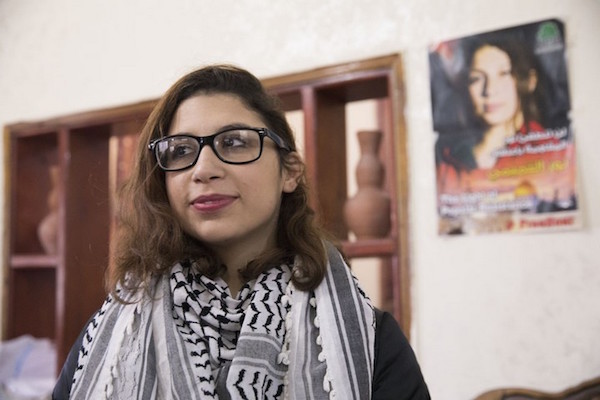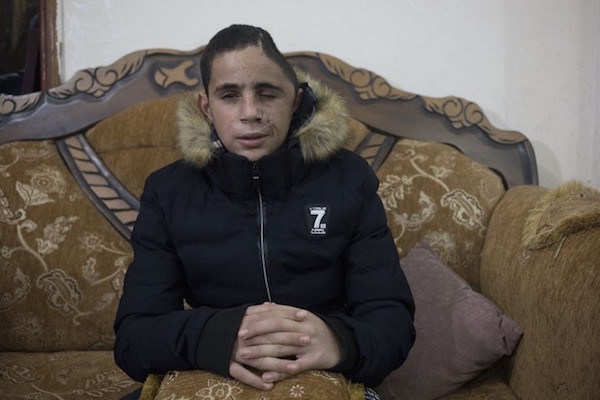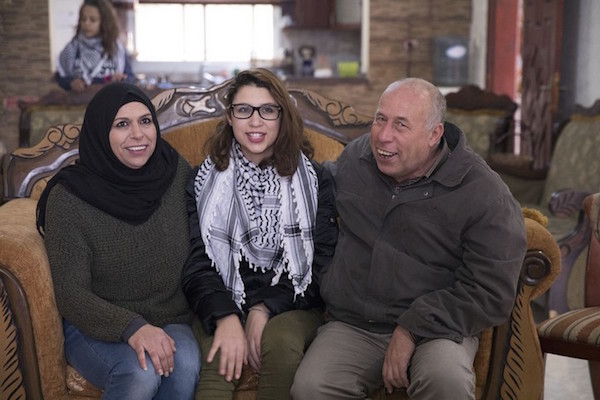Hours after she is released from military prison, Nur, who was arrested along with her cousin Ahed following the release of a now-viral video, speaks about her arrest, her time in prison, and why she isn’t deterred.
By Oren Ziv

“It’s normal, it happens every day in Palestine, that soldiers enter our village and our homes. But this time, the Israeli media made a big deal about the story and it got a lot of shares on social media,” Nur Tamimi said in an interview with +972 Magazine, hours after she was released from prison last Friday. Tamimi, 21, from Nabi Saleh, was arrested nearly two weeks ago following the publication of a video showing her and her cousin, Ahed, attempting to push soldiers off of the porch of the Tamimi family’s home. Ahed, 16, and her mother, Nariman, have been denied bail and remain in prison as they await trial.
On Thursday around midnight, after the Israeli military court of appeals rejected the prosecution’s appeal against her release, Nur was taken from the Sharon Prison to the Jabara checkpoint, and then to her home, where her family was waiting for her.
I spoke with Nur on Friday morning at her home, where her relatives, supporters, and Palestinian media had gathered. Among the visitors who came to support Nur was Mohammed Tamimi, 15, whom Israeli soldiers shot in the head with a rubber-coated bullet an hour or so before the now-famous video of Ahed and Nur was filmed. The weather was stormy, and so there wasn’t a protest in the village like most Fridays. Nevertheless, Israeli soldiers were deployed at the entrance to Nabi Saleh — presumably to remind the residents what would happen if someone dared step outside despite the rain.

“It was not an easy arrest because it was my first, but in jail I met many women who for many years have been fighting for their day-to-day survival there,” she said. “The most difficult experience was being in the prisoner transport vehicle. They would take us from the Sharon Prison at two in the morning and bring us back at 11 at night. We spent most of the time before and after the hearings in those vehicles, where it’s very cold and there’s no access to food, water, or restrooms.” Ahed was held in a cell separate from the other jailed Tamimi women because she is minor. Nur hardly saw Ahed in prison, but the last time she did, she recalled that Ahed appeared “strong and in high spirits.”
Tamimi is well aware of how the mainstream Israeli media has covered the video and the surrounding events. “Despite the Israeli media saying that we are violent, the world understands our story — that the soldiers came to our house and that we just wanted them to leave,” she said.
“The problem is that many people just watch a few minutes of the video, and only get a partial picture of what happened. They don’t know what happened before,” Nur said of the way the video was received by the Israeli public. “Soldiers shot a child in the face in our village and he was wounded very badly and in mortal danger. It is not normal to do something like that to a child. That’s why we wanted the soldiers to leave. It was a sensitive situation.”
I asked Nur if her time in prison had given her second thoughts about confronting the soldiers. “We’re aware of the costs and there’s no regrets,” she answered without hesitation. “When we see something happen in our village, we act from the heart and not from the head — without thinking beforehand about the consequences or the results. It preserves our humanity. Time in jail doesn’t make a difference.”

Naji Tamimi, Nur’s father and a well-known activist in the popular struggle against the occupation in Nabi Saleh, who himself spent time in Israeli prison for participating in protests in the village, told +972 Magazine about the general feeling after Nur’s release. “It’s a mixed feeling: I’m happy my daughter was released, but I’m still thinking about Ahed and Nariman, who remain in prison. We also need to remember that this isn’t over for Nur. She could be arrested again. There’s an indictment and we don’t know how the legal process will end for her.”
Like Nur, Naji thinks it’s important for the wider public, and the Israeli public in particular, to “see the whole story not just the two minutes of the video that were publicized. On YouTube, there’s video from the day of the incident. They can see how the army uses violence against us. They need to see the picture in its entirety. The army is present in Nabi Saleh from 10 in the morning until five in the evening, and there’s a lot of violence.”
“The occupation itself is violence,” Naji continued. “When it threatens our lives, our homes, our children, I can’t say to someone, to Nur, for example ‘why did you push or shout?’ After all, just a few minutes earlier [soldiers] shot a 15-year-old boy and wounded him badly. We continue to struggle. We will never accept the occupation. We don’t want to be in prison, or in anywhere dangerous. We just don’t want to live under occupation.”
A version of this article also appears in Hebrew on Local Call. Read it here.


